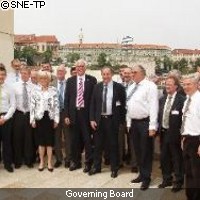Sustainable Nuclear Energy Technology Platform presents strategic research agenda
Europe's Sustainable Nuclear Energy Technology Platform (SNE-TP), launched in September 2007, has presented its strategic research agenda (SRA) outlining science and technology research and development (R&D) priorities for the next 10 years. Two issues are clearly prioritised: mitigating the effects of ageing on existing 'light-water' reactors, and preparing a demonstration of 'Generation-IV fast neutron' reactors. The SNE-TP gathers experts from industry, research organisations, universities and non-governmental organisations to coordinate efforts within a common vision for research, development and innovation in nuclear energy systems. The platform comprises 60 members from 19 European countries. According to the European Commission, 'nuclear energy, which currently provides 31% of the EU's electricity, is an important contributor to the development of the low-carbon economy.' In order to achieve the goals of reducing greenhouse emissions in Europe by 20% by 2020, and as part of efforts to realise the low-carbon society by 2050, the Commission identified the R&D prospects of key low-carbon energy technologies in their Strategic Energy Technology (SET) plan in November last year. This plan cites nuclear fission energy as a major contributor to meeting the 2020 objectives. Fast neutron reactors can multiply energy production from a given amount of uranium by a factor of more than 50. According to the SRA, a new generation of these reactors is necessary to meet current safety, operational and competitiveness standards. 'From 2040 onwards,' the SRA states, 'it is envisaged that this new generation of Fast Neutron Reactors (Gen-IV) will be operating in parallel to the advanced Gen-III Light Water Reactors now being built in Europe, thereby maintaining the current one-third share of nuclear electricity in Europe.' While developing the next generation of reactors is clearly a priority, the report says that for now, 'it is essential to facilitate the construction of new Gen-III light water reactors. Design certification should be harmonised so that requirements necessary for licensing should be the same throughout Europe.' The report also prioritises waste management efforts, stressing the importance of using more efficient cores and fuels for optimal performance and to minimise the volume and longevity of waste. The importance of continued research on partitioning and transmutation technologies is also emphasised. Within a decade, the report states, the first geological repositories for high-level nuclear waste are expected to be in operation in the EU. The SRA clearly outlines objectives for developing other applications for nuclear technology that can replace fossil-fuel-based industrial processes, such as large-scale production of hydrogen for synthesising fertilisers or refining crude oil. Research in the areas of improved materials, new fabrication and welding processes, innovative power conversion systems, enhanced safety and innovative fuels are also prioritised, as is computer modelling for detailed simulation of reactor behaviour in a range of scenarios, from normal to accident conditions. Safety is a theme throughout the agenda. 'Nuclear safety research will include research on human and organisational factors,' it reads. 'Research must also be carried out to contribute to the design of intrinsically safe Gen-IV fast neutron reactors.' The cost of maintaining research infrastructures is high. The SRA emphasises that a network of complementary facilities should be established throughout Europe; this includes upgrading existing facilities and building new ones. New facilities include experimental fuel-cycle facilities as well as extremely large-scale nuclear research facilities, such as the Jules Horowitz Material Testing Reactor in France. Additionally, the SRA addresses the importance of education and training, as highly qualified staff is essential. 'The nuclear sector must address the need to reinforce and further develop its competence pool, manage the existing knowledge, and organise a network of research infrastructures,' it states. Education and training efforts have considerable support from the European Nuclear Education Network (ENEN), funded under the EU's Framework Programmes (FP5 through FP7). The SRA, which was presented this week in Brussels, is available to the public and comments are invited from all stakeholders.
Countries
France



